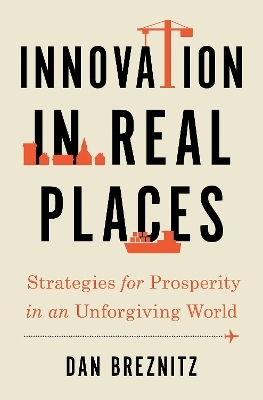
Innovation in Real Places
Oxford University Press Inc (Verlag)
978-0-19-750811-4 (ISBN)
Across the world, cities and regions have wasted trillions of dollars on blindly copying the Silicon Valley model of growth creation. Since the early years of the information age, we've been told that economic growth derives from harnessing technological innovation. To do this, places must create good education systems, partner with local research universities, and attract innovative hi-tech firms. We have lived with this system for decades, and the result is clear: a small number of regions and cities at the top of the high-tech industry but many more fighting a losing battle to retain economic dynamism.
But are there other models that don't rely on a flourishing high-tech industry? In Innovation in Real Places, Dan Breznitz argues that there are. The purveyors of the dominant ideas on innovation have a feeble understanding of the big picture on global production and innovation. They conflate innovation with invention and suffer from techno-fetishism. In their devotion to start-ups, they refuse to admit that the real obstacle to growth for most cities is the overwhelming power of the real hubs, which siphon up vast amounts of talent and money. Communities waste time, money, and energy pursuing this road to nowhere. Breznitz proposes that communities instead focus on where they fit in the four stages in the global production process. Some are at the highest end, and that is where the Clevelands, Sheffields, and Baltimores are being pushed toward. But that is bad advice. Success lies in understanding the changed structure of the global system of production and then using those insights to enable communities to recognize their own advantages, which in turn allows to them to foster surprising forms of specialized innovation. As he stresses, all localities have certain advantages relative to at least one stage of the global production process, and the trick is in recognizing it. Leaders might think the answer lies in high-tech or high-end manufacturing, but more often than not, they're wrong. Innovation in Real Places is an essential corrective to a mythology of innovation and growth that too many places have bought into in recent years. Best of all, it has the potential to prod local leaders into pursuing realistic and regionally appropriate models for growth and innovation.
Dan Breznitz is a Professor and Munk Chair of Innovation Studies in the Munk School of Global Affairs and Public Policy with a cross-appointment in the Department of Political Science of the University of Toronto, where he is also the Co-Director of the Innovation Policy Lab. He is a Fellow of the Canadian Institute for Advanced Research, where he co-founded and co-directs the program on Innovation, Equity and the Future of Prosperity. His award-winning books include Innovation and the State, The Run of the Red Queen, and The Third Globalization.
Acknowledgments
Introduction
Part I: The State of Innovation
Chapter 1: The New Globalization of Innovation
Chapter 2: The Silicon Peaches
Chapter 3: Startups are Everywhere! (But The Growth Statistics)
Chapter 4: Making America Great Again?
Part II: Innovation and Prosperity
Chapter 5: Four are Better Than One (But First, Let Us Plan It Strategically)
Chapter 6: Singing and Designing--Incrementally--Innovation-Based Growth
Chapter 7: Out With The Old, In With The New! But in What Ways?
Chapter 8: Looking for Better Options: The Science of Innovation Policies and Agencies in a Globally Fragmented World
Part III: The Three Dysfunctionals
A Short Introduction to Part III
Chapter 9: Our Anti-Intellectual Property Rights System
Chapter 10: The Road to Hell is Paved with Good Intentions: The Age of Financialization
Chapter 11: Data: Why Mining Us is the New Boom and For Whom
Conclusion: In Defense of Experiments, Mistakes, and the Right to Choose
Index
Bibliography
| Erscheinungsdatum | 06.04.2021 |
|---|---|
| Verlagsort | New York |
| Sprache | englisch |
| Maße | 155 x 236 mm |
| Gewicht | 544 g |
| Themenwelt | Sozialwissenschaften ► Soziologie ► Empirische Sozialforschung |
| Sozialwissenschaften ► Soziologie ► Spezielle Soziologien | |
| ISBN-10 | 0-19-750811-1 / 0197508111 |
| ISBN-13 | 978-0-19-750811-4 / 9780197508114 |
| Zustand | Neuware |
| Haben Sie eine Frage zum Produkt? |
aus dem Bereich


